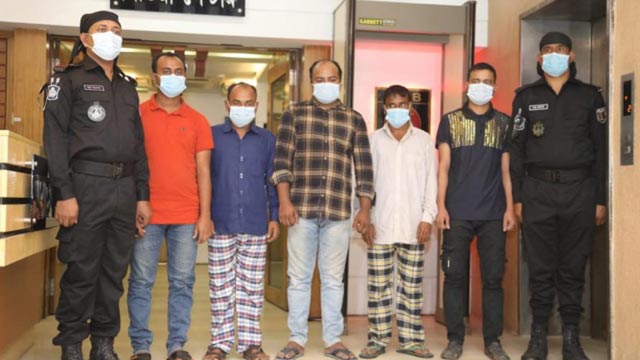They used to communicate with patients needing kidney transplant -- via pages on social media -- and locate people in remote villages from disadvantaged background as donors, luring them with money in return.
They had the tests done in Bangladesh to determine whether the donor's organ matched for the recipient.
If results come positive, they prepared fake documents denoting close kinship between the donor and recipient; took both to India and had the kidney transplant done there.
This is how an organised gang involved in illegal kidney trade benefited affluent patients at the cost of underprivileged individuals and amassed crores of taka in the process, Rapid Action Battalion said today.
The elite force came up with the information after arresting five persons, for their involvement in the illegal kidney trade, during overnight drives at Joypurhat and Dhaka.
The arrestees are: Shahrier Imran Ahmed (36), admin of two Facebook pages -- Bangladesh Kidney and Liver Patients Chikitsa Seba and Kidney Liver Chikitsa Seba; Mehedi Hasan (24); Saiful Islam (28); Abdul Mannan (45); and Tajul Islam (38).
"Around 100 low-income and poor people of the country became victims of the gang," Khandakar Al Moin, Rab's legal and media wing director, told a press briefing at Rab media centre today.
The Rab official said they arrested them upon receiving complaints from the victims.
During primary interrogation, the arrestees admitted that they used to take Tk 15-20 lakh from each kidney seeker while they promised each donor Tk 3-5 lakh. But, after successful transplant, they used to swindle the donors and pay even less, Moin said.
One of the victims told Rab that he was forced to donate his liver in India when his kidney did not match the recipient there.
A Rab member said the gang used to arrange Bangladeshi donors for Indian nationals too.
"They also arranged several kidney transplants in Bangladeshi hospitals," he said preferring anonymity.
The Rab director said the gang has 15-20 members who work in three groups.
One group used to target wealthy patients, needing kidney transplant, though the Facebook pages; another group located the donors, while the third prepared fake documents.
The gang has close relations with another group operating in the neighbouring country, he added.
Moin said they adopted a process to dodge law enforcers in the country as well as hospital authorities in India, as it's difficult to verify documents denoting kinship.
The gang has been active for 10 years and used various means to swindle people, Rab said.
According to the Transplant of Human Organ Act (amendment) 2018, a patient can obtain a kidney either from a "close relative" or from a brain-dead patient, with consent from the kin.
mj/





